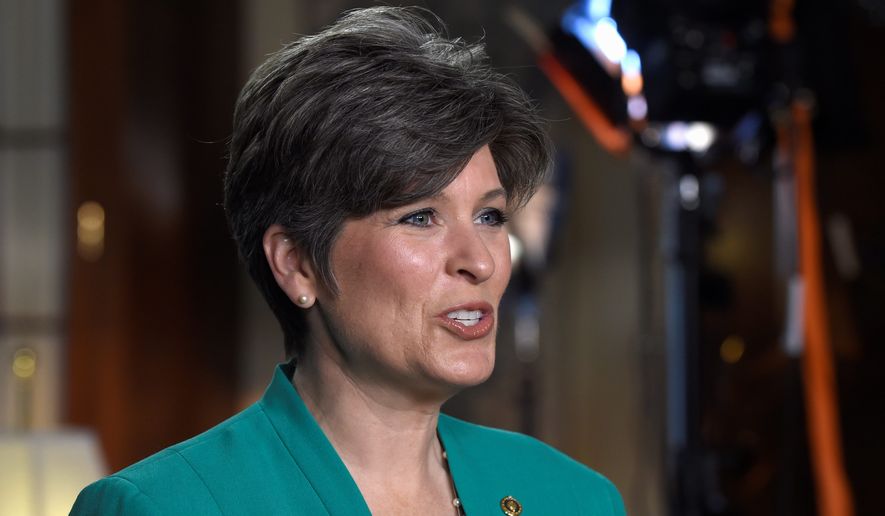Now in control of both chambers of Congress, Republicans said President Obama’s combative State of the Union address Tuesday night struck all the wrong notes, saying their election victories last year gave them a mandate to veer from his course — but they haven’t given up finding bipartisan bills to challenge his veto pen.
“We heard the message you sent in November — loud and clear. And now we’re getting to work to change the direction Washington has been taking our country,” Sen. Joni Ernst, a freshman Iowa Republican, said in the GOP’s official response, delivered at the conclusion of the president’s speech.
From international trade deals to cutting loopholes in the tax code in order to reduce rates for everyone, the GOP said there are issues where both Republicans and Mr. Obama want the same thing.
But they said it will take political courage on behalf of the president to pressure his own party on trade, and will take hard work on all sides to tackle the tax code, which has exploded in recent years, and which is defended by an army of lobbyists.
“Let’s iron out loopholes to lower rates — and create jobs, not pay for more government spending,” Ms. Ernst said. “The president has already expressed some support for these kinds of ideas. We’re calling on him now to cooperate to pass them.”
The early signs for cooperation, however, have been dim.
SEE ALSO: Joni Ernst brings outsider perspective to Republicans’ State of the Union rebuttal
The White House welcomed the new GOP Congress earlier this month by issuing two veto threats on bipartisan bills literally as members were being sworn in, and has followed up with five more veto threats in the two weeks since.
Democrats, meanwhile, accuse Republican leaders of picking issues such as building the Keystone XL pipeline or reining in parts of Obamacare that, while they have bipartisan support on Capitol Hill, strike directly at Mr. Obama.
Both parties, saying they are channeling the will of voters, are talking about the same broad issues and vowing to approach them in bipartisan fashion. But they have taken diametrically opposed approaches.
Democrats, led by Mr. Obama, argued the way to fix the tax code is to hike levies on big businesses and the wealthy, using the money to add more special tax breaks for the poor and middle-class families on child care and college costs.
Mr. Obama christened his plan “middle-class economics” and said it’s both fair and successful as a way to drive growth.
Republicans, however, argued for a flatter tax code, cleared of many of the loopholes that clutter its tens of thousands of pages, with the money being used to lower rates for everyone.
“Comprehensive tax reform is an area we might actually be able to make some progress on, but another income redistribution effort, another tax increase, obviously is not what we had in mind,” newly minted Senate Majority Leader Mitch McConnell said ahead of Mr. Obama’s speech.
Last year’s elections appear to have done little to break years of gridlock, which saw Democrats win big in 2008, the GOP win seats in 2010 — including taking control of the House — and Democrats win some seats in the House and Senate back in 2012, along with Mr. Obama’s re-election.
Even the GOP’s huge gains in 2014 — netting nine Senate seats, a dozen House seats and two new governor’s mansions, in addition to hundreds of state legislative seats — haven’t shaken the foundations of either party, with Mr. Obama and congressional leaders each insisting they have the voters’ backing, and it is the other side’s duty to cave.
Sen. Shelley Moore Capito, a newly elected Republican from West Virginia, recounted an exchange with a voter during a recent flight to Washington where they talked about the looming State of the Union address and Mr. Obama’s tax plan. She said the man just rolled his eyes and said, “More gridlock?”
“That’s what we are saying, and I am saying here, ’No more gridlock,” Mrs. Capito said at a press conference with Mr. McConnell and other GOP senators at the Capitol.
The GOP itself, meanwhile, is trying to control divisions within its ranks between very conservative lawmakers, who argue for confrontation over everything from Obamacare to immigration, and leaders who say voters want to see Congress make progress on at least some issues, which means dealmaking with Mr. Obama.
• Stephen Dinan can be reached at sdinan@washingtontimes.com.




Please read our comment policy before commenting.